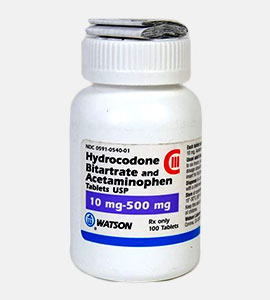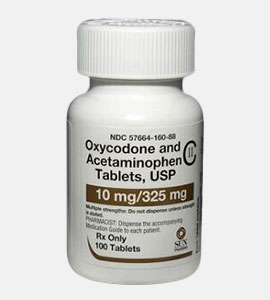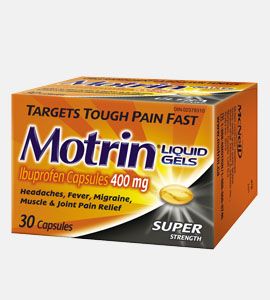Description
Important Information
Hydrocodone can slow or stop your breathing. Never use this medicine in larger amounts, or for longer than prescribed. Do not crush, break, or open an extended-release pill. Swallow it whole to avoid exposure to a potentially fatal dose.
Hydrocodone may be habit-forming, even at regular doses. Never share this medicine with another person, especially someone with a history of drug abuse or addiction. Keep the medication in a place where others cannot get to it.
MISUSE OF OPIOID MEDICINE CAN CAUSE ADDICTION, OVERDOSE, OR DEATH. Keep the medication in a place where others cannot get to it.
Tell your doctor if you are pregnant. Hydrocodone may cause life-threatening withdrawal symptoms in a newborn if the mother has taken this medicine during pregnancy.
Fatal side effects can occur if you use opioid medicine with alcohol, or with other drugs that cause drowsiness or slow your breathing.
Before taking this medicine
You should not use hydrocodone if you are allergic to it, or if you have:
• severe asthma or breathing problems; or
• a blockage in your stomach or intestines.
To make sure hydrocodone is safe for you, tell your doctor if you have ever had:
• breathing problems, sleep apnea;
• a head injury, brain tumor, or seizures;
• drug or alcohol addiction, or mental illness;
• urination problems;
• liver or kidney disease;
• problems with your gallbladder, pancreas, or thyroid; or
• a heart rhythm disorder called long QT syndrome.
If you use opioid medicine while you are pregnant, your baby could become dependent on the drug. This can cause life-threatening withdrawal symptoms in the baby after it is born. Babies born dependent on opioids may need medical treatment for several weeks.
Do not breastfeed while taking this medicine. Hydrocodone can pass into breast milk and cause drowsiness, breathing problems, or death in a nursing baby.
How should I take hydrocodone?
Hydrocodone may be habit-forming, even at regular doses. Follow the directions on your prescription label and read all medication guides. Never use hydrocodone in larger amounts, or for longer than prescribed. Tell your doctor if you feel an increased urge to take more of this medicine.
Never share opioid medicine with another person, especially someone with a history of drug abuse or addiction. MISUSE CAN CAUSE ADDICTION, OVERDOSE, OR DEATH. Keep the medication in a place where others cannot get to it. Selling or giving away opioid medicine is against the law.
Your dose needs may be different if you have recently used a similar opioid pain medicine and your body is tolerant to it. Talk with your doctor if you are not sure you are opioid-tolerant.
Do not crush, break, or open an extended-release pill. Swallow it whole to avoid exposure to a potentially fatal dose. Never crush or break a hydrocodone pill to inhale the powder or mix it into a liquid to inject the drug into your vein. This can cause death.
Do not stop using this medicine suddenly after long-term use, or you could have serious withdrawal symptoms. Ask your doctor how to safely stop using hydrocodone.
Store at room temperature, away from heat, moisture, and light. Keep track of your medicine. You should be aware if anyone is using it improperly or without a prescription.
Do not keep leftover opioid medication. Just one dose can cause death in someone using this medicine accidentally or improperly. Ask your pharmacist where to locate a drug take-back disposal program. If there is no take-back program, flush the unused medicine down the toilet.
What happens if I miss a dose?
Since hydrocodone is used for pain, you are not likely to miss a dose. Skip any missed dose if it is almost time for your next dose. Do not use two doses at one time.
What should I avoid while taking hydrocodone?
Do not drink alcohol. Dangerous side effects or death could occur.
Avoid driving or hazardous activity until you know how hydrocodone will affect you. Dizziness or drowsiness can cause falls, accidents, or severe injuries.
Hydrocodone side effects
Get emergency medical help if you have signs of an allergic reaction to hydrocodone: hives; difficult breathing; swelling of your face, lips, tongue, or throat.
Opioid medicine can slow or stop your breathing, and death may occur. A person caring for you should seek emergency medical attention if you have slow breathing with long pauses, blue colored lips, or if you are hard to wake up.
Stop using hydrocodone and call your doctor at once if you have:
• noisy breathing, sighing, shallow breathing, breathing that stops during sleep;
• a low heart rate or weak pulse;
• pain or burning when you urinate;
• confusion, tremors, severe drowsiness;
• a light-headed feeling, like you might pass out; or
• low cortisol levels - nausea, vomiting, loss of appetite, dizziness, worsening tiredness or weakness.
Seek medical attention right away if you have symptoms of serotonin syndrome, such as: agitation, hallucinations, fever, sweating, shivering, fast heart rate, muscle stiffness, twitching, loss of coordination, nausea, vomiting, or diarrhea.
Serious side effects may be more likely in older adults and those who are malnourished or debilitated.
Long-term use of opioid medication may affect fertility (ability to have children) in men or women. It is not known whether opioid effects on fertility are permanent.
Common hydrocodone side effects may include:
• constipation, nausea, vomiting;
• dizziness, drowsiness, feeling tired;
• headache; or
• cold symptoms such as stuffy nose, sneezing, sore throat.
What other drugs will affect hydrocodone?
You may have breathing problems or withdrawal symptoms if you start or stop taking certain other medicines. Tell your doctor if you also use an antibiotic, antifungal medication, heart or blood pressure medication, seizure medication, or medicine to treat HIV or hepatitis C.
Opioid medication can interact with many other drugs and cause dangerous side effects or death. Be sure your doctor knows if you also use:
• cold or allergy medicines, bronchodilator asthma/COPD medication, or a diuretic ("water pill");
• medicines for motion sickness, irritable bowel syndrome, or overactive bladder;
• other narcotic medications - opioid pain medicine or prescription cough medicine;
• a sedative like Valium - diazepam, alprazolam, lorazepam, Xanax, Klonopin, Versed, and others;
• drugs that make you sleepy or slow your breathing - a sleeping pill, muscle relaxer, medicine to treat mood disorders or mental illness; or
• drugs that affect serotonin levels in your body - a stimulant, or medicine for depression, Parkinson's disease, migraine headaches, serious infections, or nausea and vomiting.
This list is not complete. Other drugs may interact with hydrocodone, including prescription and over-the-counter medicines, vitamins, and herbal products. Not all possible interactions are listed here.



